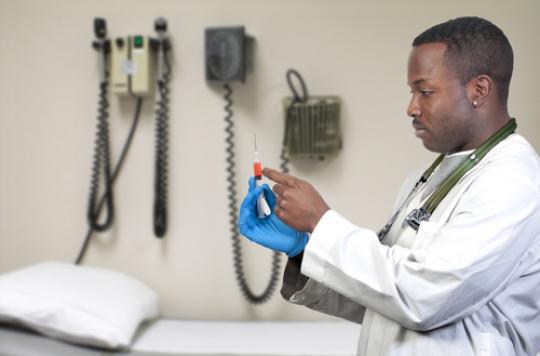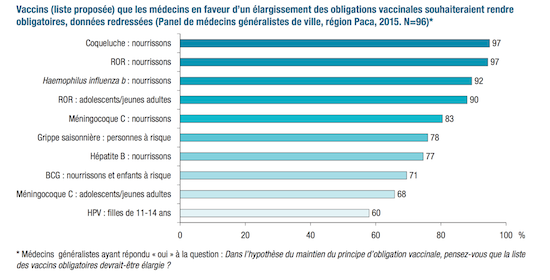The vast majority of general practitioners support compulsory vaccination. But they recognize that the coexistence with recommended vaccines is difficult to decipher.

Doctors favor vaccination. At the time of the debate launched by Marisol Touraine last January, 440 general practitioners living in the Provence-Alpes-Côte-D’azur (PACA) region were questioned. They seem in favor of maintaining the current regime, which combines compulsory and recommended vaccines. In any case, this is the conclusion of the last Weekly Epidemiological Bulletin (BEH), published by Santé Publique France. However, the responses highlight the gaps in training in this area.
A poorly understood diet
Vaccination remains a delicate subject in France, even when it is compulsory.
Thus, 13% of health professionals “often” or “always” meet hesitant parents. Most (64%) encounter them from time to time. Faced with questions and reluctance, respondents admit sometimes feeling in difficulty. The French regime, which makes recommendation and obligation coexist, is at the heart of their declarations. A third of general practitioners find it difficult to explain the nuance to families. The existence of vaccines that combine the two types of strain makes it even more difficult for them. The same proportion say that convincing parents of the need for such a product is not easy.
If doctors have trouble deciphering the file for their patients, it is undoubtedly because they do not have a good grasp of it. 39% believe that the recommended vaccines are “lower priority” than the mandatory ones. Blatant proof of the unease: the authors of the BEH find this result worrying. “This corroborates the idea that this coexistence of regimes is a source of misunderstanding both for the general population and for health professionals and also underlines a lack of training of doctors in the field of vaccination”, they write. In fact, the two regimes are of equal importance.

Extend the vaccine obligation
Despite the errors and hesitations, the vast majority of health professionals are in favor of compulsory vaccination. But they do not all agree on how to apply this measure: 48% say it should apply to certain vaccines. 44% believe that it is necessary for all the products available. The latter practice less alternative medicine, doubt less about the usefulness of vaccinations… but they also have more difficulty in explaining the coexistence of the two regimes. “The main result of this survey, suggesting that the majority of GPs in Paca do not want the vaccination obligations in force for children to be lifted, joins those of our first survey on vaccination”, underline the authors of the study. Indeed, only 5% are in favor of a religious or philosophical exemption.
Health professionals are more divided in the face of a concrete case. If the vaccine obligation were maintained in France, they would only be 24% to support an expansion of the list. Vaccines against pertussis,Haemophilus influenzae type B and MMR (measles-mumps-rubella) are supported by the majority of them. Those protecting against tuberculosis (BCG), group C meningococcus and papillomavirus receive fewer positive votes.

The sacred union
The other scenario brings together general practitioners more. If the obligation was lifted, 81% would mobilize to convince parents. Less than 1% would advise against this preventive gesture. They are more often a follower of gentle doctors, have more doubts about the usefulness of a vaccine and have a harder time persuading their patients.
This motivation does not come from nowhere: the same proportion of doctors think that lifting the obligation could be accompanied by a decline in vaccination coverage. For a third of them, this risk is even very important. “The compulsory nature of vaccination against diphtheria, tetanus and polio is probably perceived by doctors as a bulwark against a risk of decline in vaccination of young children”, suppose the authors of the BEH. It must be said that history confirms these fears: the BCG vaccine is no longer mandatory since 2007. Only 85% of children born in 2013 are protected.
.















